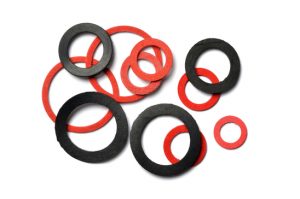
Seals play an important role in the manufacturing industry. Most manufacturing companies rely on machines to convert materials into fully or partially finished products. Within these machines are passages through which oil and liquids flow. Seals are used around the mating surfaces of these passages to protect against leaks. When shopping for seals, though, you may discover that some of them are vulcanized. What are vulcanized seals exactly?
Overview of Vulcanized Seals
A vulcanized seal is a type of gasket that’s made of vulcanized rubber. Like all seals, it’s designed to protect against leaks. Vulcanized seals are typically installed around the mating surface where two pipes, hoses or other passages meet. Once installed, they create a sealed surface between the joined passages. The difference is that vulcanized seals are made exclusively of vulcanized rubber, whereas other seals are made of other, non-vulcanized materials.
How Vulvanized Seals Are Made
Vulcanized seals are defined by the way in which they are produced. They are made of vulcanized rubber, which requires vulcanization. Vulcanization, of course, is a hardening process. Rubber is vulcanized using a combination of heat, pressure and adhesives. A typical vulcanized seal consists of two ends that are bound together using these elements.
Most seals consist of two ends that are separated by a lip. This allows them to installed on two passages. The mating surface of two pipes, for instance, can use a seal. One end of the seal will fit around one pipe, whereas the other end of the seal will fit around the opposite pipe. Vulcanized seals feature this same design consisting of two ends. With that said, the ends of a vulcanized seal are chemically bonded to ensure a superior level of protection against leaks. When exposed to heat, pressure and adhesives, the two ends bond together.
Benefits of Vulcanized Seals
Because they are made of vulcanized rubber, vulcanized seals offer several benefits. For starters, they are exceptionally strong and durable. Some reports suggest that vulcanized rubber is 10 times stronger than traditional, natural rubber. As a result, vulcanized seals are highly effective at protecting against leaks.
Like traditional rubber seals, vulcanized seals are resistant to oxidation. You don’t have to worry about them rusting, corroding or otherwise sustaining damage from oxidation. Vulcanized seals are nearly immune to oxidation-related damage.
Vulcanized seals are also resistant to solvents. Solvents can break down seals made of many other seals. If exposed to a solvent, a seal may degrade to the point where it causes oil or liquids to leak. Vulcanized seals, though, are resistant to solvents.
